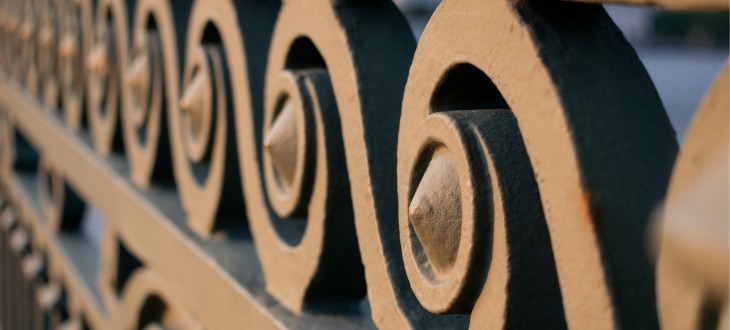Many people assume that wrought iron and cast iron are the same material, but in fact, there are many differences between the two. The production processes that are followed to create these two materials are what really sets them apart, and you’ll find they have different properties and benefits. To help you decide which material would be the best option for your next project, keep reading as we discover what the key differences are when comparing wrought iron vs cast iron.
What is wrought iron?
In the simplest terms, wrought iron is a type of iron that is heated and then worked on with tools. It’s mainly made from elemental iron, with a little slag added into the mixture. In order to create wrought iron, the material is heated and then worked on with tools to create its shape. The great thing about wrought iron is that it’s very malleable. This allows the material to be heated and then reheated in the future so that you can create different shapes to fit your needs.
When comparing wrought iron vs cast iron, you may be surprised to learn that the more you work on wrought iron, the stronger the material gets. It is composed of less carbon than you’ll find in cast iron, which makes this type of iron both more ductile and softer to work with. No matter how much pressure is applied to wrought iron, it’s likely to withstand high levels of pressure before it fails.
One thing to keep in mind is that wrought iron is often labeled incorrectly today. Many companies use this term to describe any type of steel that’s painted black, but it isn’t the material we’ve described above. Real wrought iron will be created by a blacksmith, who will use their skills and experience to heat up the iron and then create the shape that’s desired.
What is cast iron?
Cast iron is a type of iron that is melted first before it’s poured into a mold and left to cool and solidify. A variety of iron alloys can be given the label of cast iron, but generally, we use this term to describe gray iron. While you might think that cast iron would be pure iron, it actually contains up to four percent carbon and a little manganese and silicon. It’s not uncommon for sulfur and phosphorus to also be mixed into the material, creating a hard but non-malleable iron.
Cast iron is much more brittle when comparing wrought iron vs cast iron, but it’s still a strong material to use in a wide range of applications. The mixture of carbon and iron gives it these unique properties. It can’t typically be stretched or hammered into your desired shape, as this may result in it ending up bent or distorted. The good news is that it has a very good compression strength, so you’ll still find that it’s a very hard-wearing material.
The Differences Between Cast Iron and Wrought Iron
When comparing wrought iron vs cast iron, you’ll find there are many differences between these two materials. The production process is the number one thing that sets them both apart, however, the end results also need to be considered. Every time that you heat up wrought iron, you will find that it continues to get stronger and stronger. This is why we often find companies use wrought iron for a variety of commercial applications, as it’s a long-lasting material with many applications and benefits.
Although we generally consider wrought iron to be stronger, cast iron is a harder material. This means that it’s less likely to become deformed when put under pressure or stress, which is essential for many applications. Keep in mind that both types of iron may become corroded when they are exposed to oxygen and moisture. You’ll want to think about the best ways to protect either of these types of metal, to ensure they aren’t exposed to humidity and precipitation in the future. Both materials are excellent options for a variety of projects, and our team will be on hand to help you decide which option would be best for you in the future.
Visit Tampa Steel and Supply for Quality Steel and Metal Supply
Are you in need of steel supplies and processing? Look no further than the professionals at Tampa Steel and Supply. We stock an extensive list of steel products for whatever project you need to tackle. We’re proud to have served our customers for nearly four decades and are ready to assist you with your steel needs. Have questions? Give us a call today to learn more, or stop by our beautiful Tampa showroom.
Request a Quote Online
Or Call Tampa Steel & Supply at (813) 241-2801

